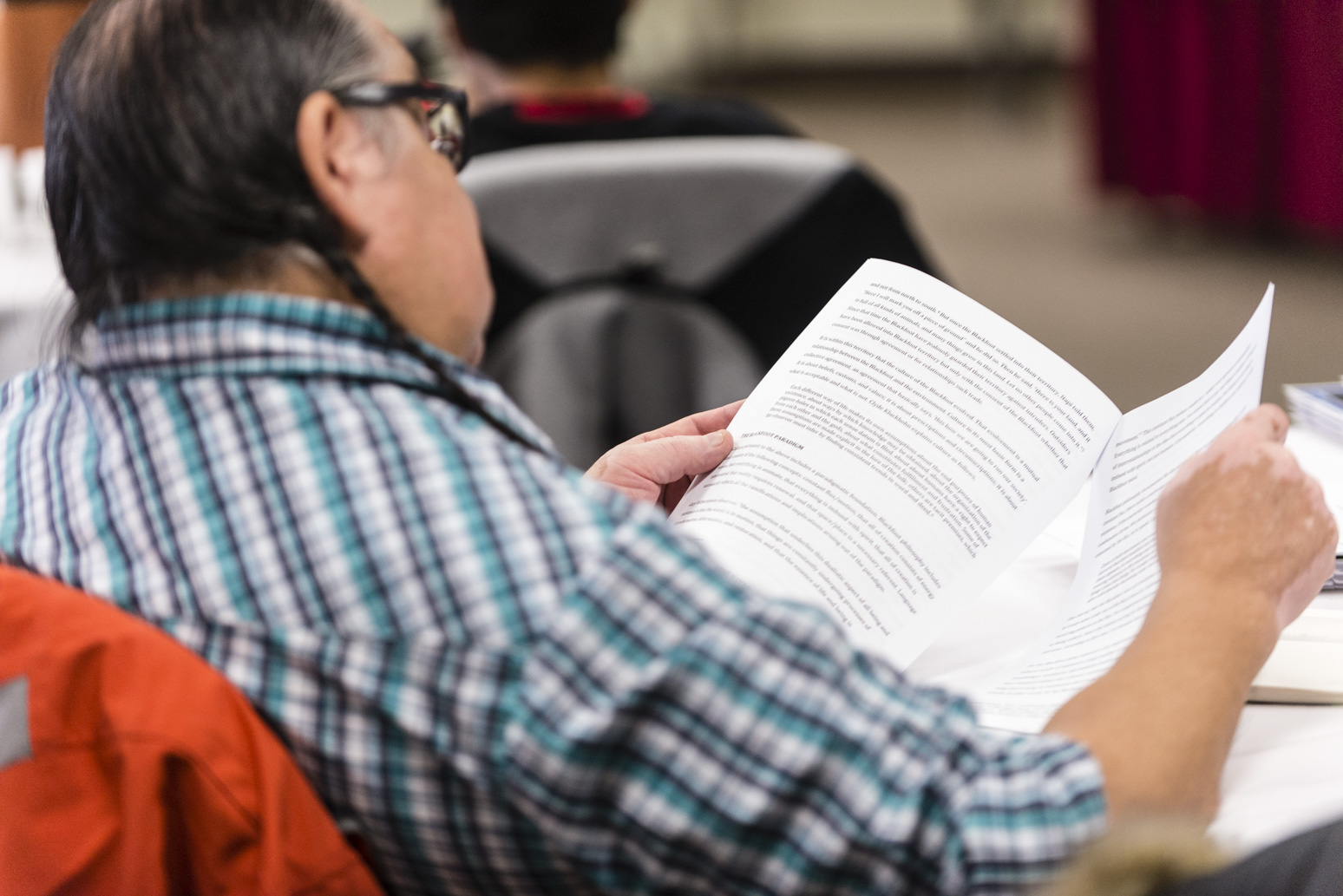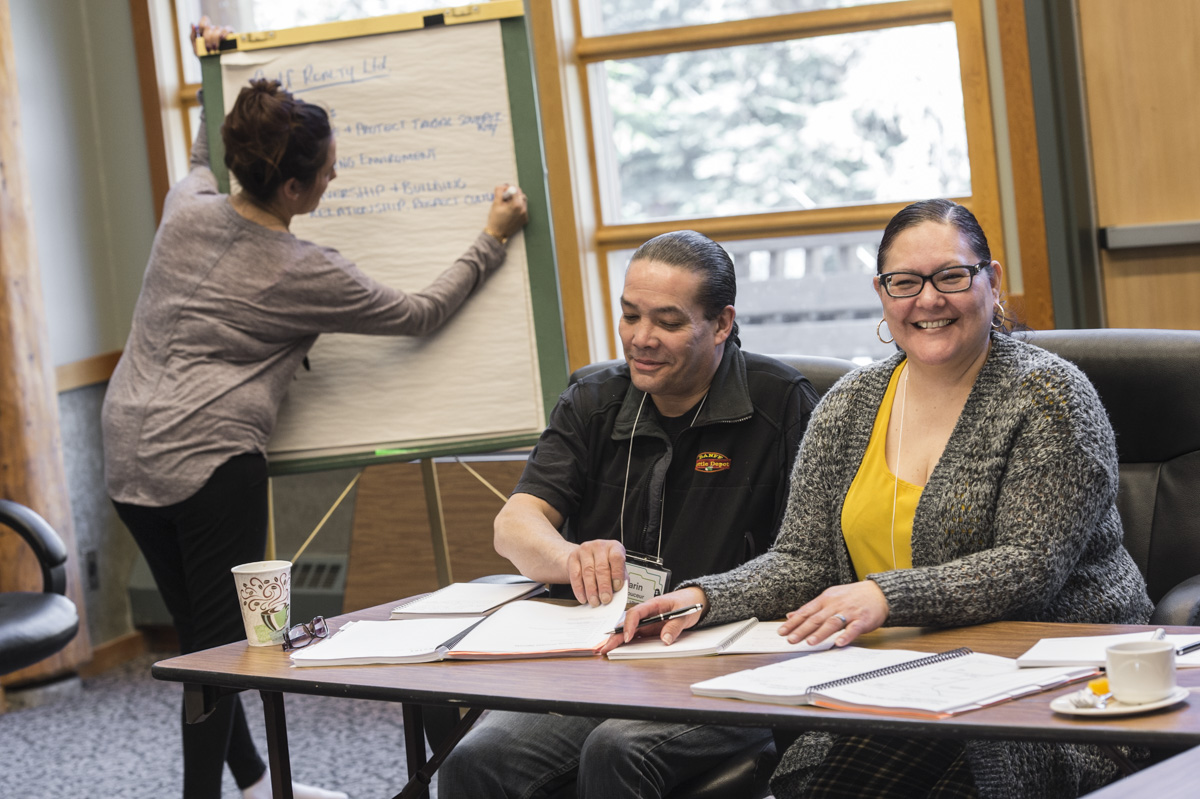How Getting a Foot in the Door Can Launch Indigenous Careers

Sometimes all you need to launch an incredible career is a foot in the door. No one knows this better than Percy Rain, Banff Leadership alumnus and member of the Paul First Nation. “Some people live in poor conditions and they give up hope. I always point out that we have services that can make you be what you want to be in life.”
One of those services is Kaskihowin Aboriginal Business Services Ltd. (KABS), a majority Aboriginal owned company launched by Rain and now headed by Métis businessman Bill Hunter. Based in Stony Plain, Alberta, the primary objective of KABS is to use employment as a means to strengthen communities and help individuals get better jobs in the long term. One of their services is to facilitate the connection between businesses and indigenous workers.
Rain and Hunter named their business “Kaskihowin” after the Cree word meaning “We strive to succeed.” Rain believes that as an Indigenous person, success means modelling the efforts of his people. “It's never about money for me, it's more about developing people and giving them the opportunity to learn from guidance.”
He says he took these lessons from his mother, now 70, who was the Chief of his nation growing up, and a role model for good leadership. “She was that type of person who said ‘There’s always a better way of life. I’ve lived 70 years...and I don’t want to reflect on the bad, I want to reflect on the good and what’s positive for the future’.”
Percy Rain
By establishing KABS, an organization dedicated to helping Indigenous people get a foot in the door, find work, and build a rewarding career, Rain has done his part to ensure there will be plenty of what’s positive for the future.
After working in the energy industry for many years, Rain observed that companies rarely have a good understanding of what the government means when it calls for ‘Aboriginal Engagement’.
“Every business had a different focus [on Aboriginal engagement] because the government keeps throwing out these concepts that no one really interprets on the industry side,” says Rain.
Now he helps companies understand what the government is asking and works with industries to discover how the communities themselves want to be engaged. In some communities, engagement can be interpreted as a contractual understanding where money is provided for bursaries and scholarships, or even as political understanding in which land rights are explored.
Engagement can also mean training and developing an Indigenous workforce, and that's where KABS comes in. With the unemployment rate for indigenous people double that of the non-indigenous population, and even higher for those living on reserves, Rain says, “In this day and age, you look in Aboriginal communities across Canada and think what are so many of them doing on welfare and social services. Creating an Aboriginal workforce gives guidance to make leadership concepts for individuals in Indigenous communities to try and make them who they need to be as an adult.”
As long as I’m here, I’m still going to try to direct guidance and try and get young people to where they need to be in regards to career path.
Percy Rain
Rain deeply values the importance of an Indigenous workforce, but he knows all too well how difficult it can be to break into the job market as an Indigenous person. He knows that qualifications have to be even higher.
Rain started off his career in labour, washing floors at a large energy company — this, despite having a business degree. “But I said, you know what, I'm going to take this, and after four years, I worked my way up to the HR department, and I showed them that I could do that level of job, until they really evaluated who I was,” he says. “I want to see more successes of that nature. Sometimes the most realistic way to success is getting out to do that labour work. To humble yourself to try and get that ethical practice within yourself as a person.”
When he thinks back to that time, Rain regards how he got his start as a success — that he didn't overlook the labour job just because he had a degree. “Sometimes the simplest job can be the best learning experience. I’ll be honest with you, for three years doing some of that work, it became a routine, but you know what, I wanted to do the best job I could even just being a labourer.”
The experience Rain gained in that position eventually helped him as he moved into his role with HR. Because he understood what would motivate them in their work, he could better empathize with labourers.
Rain acknowledges that were he not Indigenous, he probably wouldn't have had to start out as a labourer with a business degree. “I think even in the education system, ...you’ve got to prove yourself. You have to put in that extra effort, because a lot of the time, especially in those times back then, you were labelled as being just an Indian”.
Rain has never let the discrimination he faced as an Indigenous person hold him back. “It’s how you look at it. For me, it was always, you’ve got to be a better person. How you look at the world is that you have to be fair to everyone, because everyone deserves a fair opportunity. As long as I’m here, I’m still going to try to direct guidance and try and get [young people] to where they need to be in regards to career path.”

Participants in the Negotiations Skills Training program get hands-on experience with the skills they have learned
When Rain offers guidance to young people in his community or to his four nieces and nephews that he helped raise, he always underlines the importance of getting an education. After getting his business degree, Rain continued his personal development by taking two Indigenous Leadership and Management Courses at The Banff Centre: Negotiation Skills Training and Best Practices in Indigenous Business and Economic Development.
Rain says the Best Practices in Indigenous Business and Economic Development course opened his eyes to ways of establishing himself in mainstream society and finding opportunities for indigenous and non-indigenous companies to work together.
Rain found that his experiences in the courses at Banff Centre brought to light skills that he didn’t know he possessed. “There are so many practical experiences in these courses that make you think, make you rejuvenate your mind about business ...and it brought a lot of leadership qualities I never knew I had. If I didn’t have that experience... I honestly don’t think I would have had the courage to be where I’m at today.”